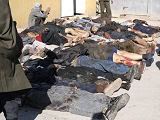
"Ministers were told not to rubbish Iraq deaths study"
The Guardian reports:
Chief government advisers accepted as "robust" research that put the death toll from the Iraq war 10 times higher than any previous estimate, new documents have revealed.
The study, by the Johns Hopkins School of Public Health, prompted worldwide alarm when it was published in the Lancet medical journal in October last year.
It estimated that 655,000 Iraqis had died due to the violence in the country. It has now emerged chief advisers warned ministers not to "rubbish" the report.
At the time, both the British and US governments were quick to dismiss the peer reviewed study. The Foreign Office said it was based on a "fairly small sample ...extrapolated across the country". Iraqi government data was more likely to be accurate, it added.
The US was more blunt. President George Bush said: "I don't consider it a credible report."
However, according to papers obtained by the BBC World Service's Newshour programme under the Freedom of Information Act, senior officials warned the methods used in the survey were "robust" and "close to best practice".
The survey came up with its findings by comparing mortality rates before and after the invasion. Researchers surveyed 47 randomly-chosen areas across 16 provinces in Iraq, speaking to nearly 1,850 families, comprising more than 12,800 people.
One of the documents obtained by the BBC is a memo by the Ministry of Defence's chief scientific adviser, Sir Roy Anderson, dated October 13 2006, two days after the report was published.
"The study design is robust and employs methods that are regarded as close to 'best practice' in this area, given the difficulties of data collection and verification in the present circumstances in Iraq," he says.
Another item is an exchange of emails between officials in which one asks: "Are we really sure the report [in the Lancet] is likely to be right? That is certainly what the brief implies."
Another replies: "We do not accept the figures quoted in the Lancet survey as accurate." Later in the same email, the same official writes: "However, the survey methodology used here cannot be rubbished, it is a tried and tested way of measuring mortality in conflict zones."
In a statement issued to Newshour, the government said: "The methodology has been used in other conflict situations, notably the Democratic Republic of Congo.
"However, the Lancet figures are much higher than statistics from other sources, which only goes to show how estimates can vary enormously according to the method of collection.
"There is considerable debate amongst the scientific community over the accuracy of the figures."

No comments:
Post a Comment